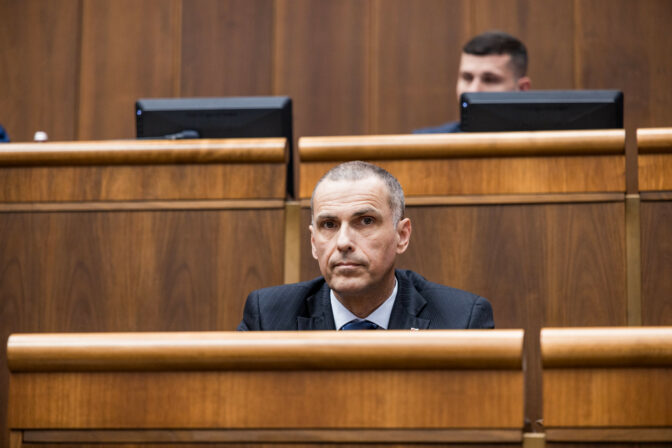BRATISLAVA, April 18, (WEBNOVINY) — Chairman of the opposition SNS Jan Slota believes that the adoption of the new Hungarian Constitution in the Budapest parliament is a display of the systematic efforts of the Viktor Orban administration to annul the effects of the Trianon Treaty and rearrange post-war Europe. “The constitution has created prerequisites for Hungary’s claim to the territory of Great Hungary. Granting the voting rights to foreign Hungarians is the preparation to blur the difference between Hungarians in Hungary and ethnic Hungarians abroad,” Slota said. He also pointed to the fact that the southern neighbor of Slovakia dropped the word “republic “ from its new constitution and according to the new basic law, the country will simply be called “Hungary.”
Head of the MOST-HID deputy club Laszlo Solymos says that the adoption of the Hungarian constitution regards first of all Hungary. He said that Slovakia should approach the matter to the extent it deserves. Regarding the election right for ethnic Hungarians living abroad, he said that this stipulation contains a reference to an executive guideline. “It is necessary to wait for its wording,” he said. According to Solymos the right to vote should be given firstly to those to whom results of the elections will concern.
“Takeover of responsibility for the fate of Hungarians living outside the country with support of collective self-governments and the voting right without a direct tie to the residence in the territory of Hungary is what the KDH minds most regarding the new Hungarian constitution approved by Budapest lawmakers earlier on Monday. “We regret that the KDH has to point at some problematic points in the approved document,” said KDH leader Jan Figel at a news conference. He said that his party will protect national and state interests of Slovakia and its citizens. “Sovereignty of the Slovak Republic is inviolable and therefore we reject application of a law of another state in our territory. We consider unquestionable the principle that exterritoriality is prohibited,” stated the KDH leader. The party proposes that the Coalition Council and then also parliament deal with the situation after the Hungarian constitution was approved.
Head of the SNS deputy caucus Rafael Rafaj announced that his party has prepared a draft resolution for the next parliamentary session urging the Slovak Parliament to take an unambiguous stance on a package of problems burdening Slovak-Hungarian relations. “We believe that it will wake up and eventually revive the zero foreign policy of the current ruling coalition and will not sweep these extremely serious issues under the carpet though Bela Bugar as a Trojan Horse of Budapest is likely to neigh in disagreement, “ said Rafaj in his reaction to the new constitution of Budapest. He believes it is based on pervert ambitions of the Great Hungarian irridenta and confirms that Hungary does not and will never respect the core post-war treaties on the territorial arrangement of Europe and continues creating extraterritorial legislation representing a threat to neighboring countries. Rafaj added that the SNS will do its utmost to protect the territory and all national and state interests of the Slovak Republic and believes as well that also other parliamentary parties will eventually start listen to it.
Hungary’s parliament approved the new constitution on Monday, with 262 votes, 44 against and one abstention. It is to replace the older document from 1949, amended forty years later in reaction to the end of the Communist regime. The legislation features a great deal of controversial parts, of which the election right granted to Hungarian living outside the country has triggered the harshest criticism. Critics argue that it will boost the position of the prime minister and his Fidesz party. Shortly before its adoption, visiting U.N. Secretary General Ban Ki-moon recommended that Budapest consults its new constitution with international institutions. Hungarian President is expected to seal the constitution due to his close relations to Prime Minister Viktor Orban. Then, the law will take effect on Jan. 1, 2012.
SITA












